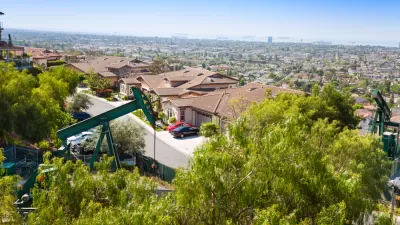What a revision! The EIA changed the recoverable oil reserves in California's vast Monterey Shale formation from 13.7 billion barrels to 600 million barrels using existing technology. Also, for the first time, a California county banned fracking.
The Energy Information Administration (EIA) is expected to release the revised estimates next month in what will be "a blow to the nation's oil future", writes Louis Sahagun, and also a disappointment for the state's economy. Sacramento was hoping that the new drilling would bring "2.8 million new jobs to California and boost tax revenue by $24.6 billion annually" according to a 2013 University of Southern California analysis [PDF].
"The Monterey Shale formation (see map) contains about two-thirds of the nation's shale oil reserves," writes Sahagun. So what caused the downward revision of recoverable oil from the formation?
The energy agency said the earlier estimate of recoverable oil, issued in 2011 by an independent firm under contract with the government, broadly assumed that deposits in the Monterey Shale formation were as easily recoverable as those found in shale formations elsewhere.
It isn't, thanks to California's geology - particularly its seismic activity.
Unlike heavily fracked shale deposits in North Dakota and Texas, which are relatively even and layered like a cake, Monterey Shale has been folded and shattered by seismic activity, with the oil found at deeper strata.
Sierra Club California, a strong opponent of fracking that has been advocating a moratorium included in Senate Bill 1132, greeted the news with caution. "The new estimates won't discourage the oil companies and oil industry service companies", states their press release.
Indeed, Tupper Hull, spokesman for the Western States Petroleum Association, stated, "We have a lot of confidence in the intelligence and skill of our engineers and geologists to find ways to adapt."
On the political front, Santa Cruz County became the first to ban fracking in the state with the Board of Supervisor's unanimous 5-0 vote, writes Jason Hoppin of the Santa Cruz Sentinel.
The move, however, is largely symbolic: There are no known oil leases in Santa Cruz County, nor has it been targeted by oil prospectors.
But other counties with proven oil reserves may follow. "Butte, Santa Barbara and San Benito counties are all considering fracking bans. Beverly Hills also recently passed a ban, becoming the first city to do so."
FULL STORY: U.S. officials cut estimate of recoverable Monterey Shale oil by 96%

Alabama: Trump Terminates Settlements for Black Communities Harmed By Raw Sewage
Trump deemed the landmark civil rights agreement “illegal DEI and environmental justice policy.”

Study: Maui’s Plan to Convert Vacation Rentals to Long-Term Housing Could Cause Nearly $1 Billion Economic Loss
The plan would reduce visitor accommodation by 25% resulting in 1,900 jobs lost.

Planetizen Federal Action Tracker
A weekly monitor of how Trump’s orders and actions are impacting planners and planning in America.

Wind Energy on the Rise Despite Federal Policy Reversal
The Trump administration is revoking federal support for renewable energy, but demand for new projects continues unabated.

Passengers Flock to Caltrain After Electrification
The new electric trains are running faster and more reliably, leading to strong ridership growth on the Bay Area rail system.

Texas Churches Rally Behind ‘Yes in God’s Back Yard’ Legislation
Religious leaders want the state to reduce zoning regulations to streamline leasing church-owned land to housing developers.
Urban Design for Planners 1: Software Tools
This six-course series explores essential urban design concepts using open source software and equips planners with the tools they need to participate fully in the urban design process.
Planning for Universal Design
Learn the tools for implementing Universal Design in planning regulations.
Caltrans
Smith Gee Studio
Institute for Housing and Urban Development Studies (IHS)
City of Grandview
Harvard GSD Executive Education
Toledo-Lucas County Plan Commissions
Salt Lake City
NYU Wagner Graduate School of Public Service




























